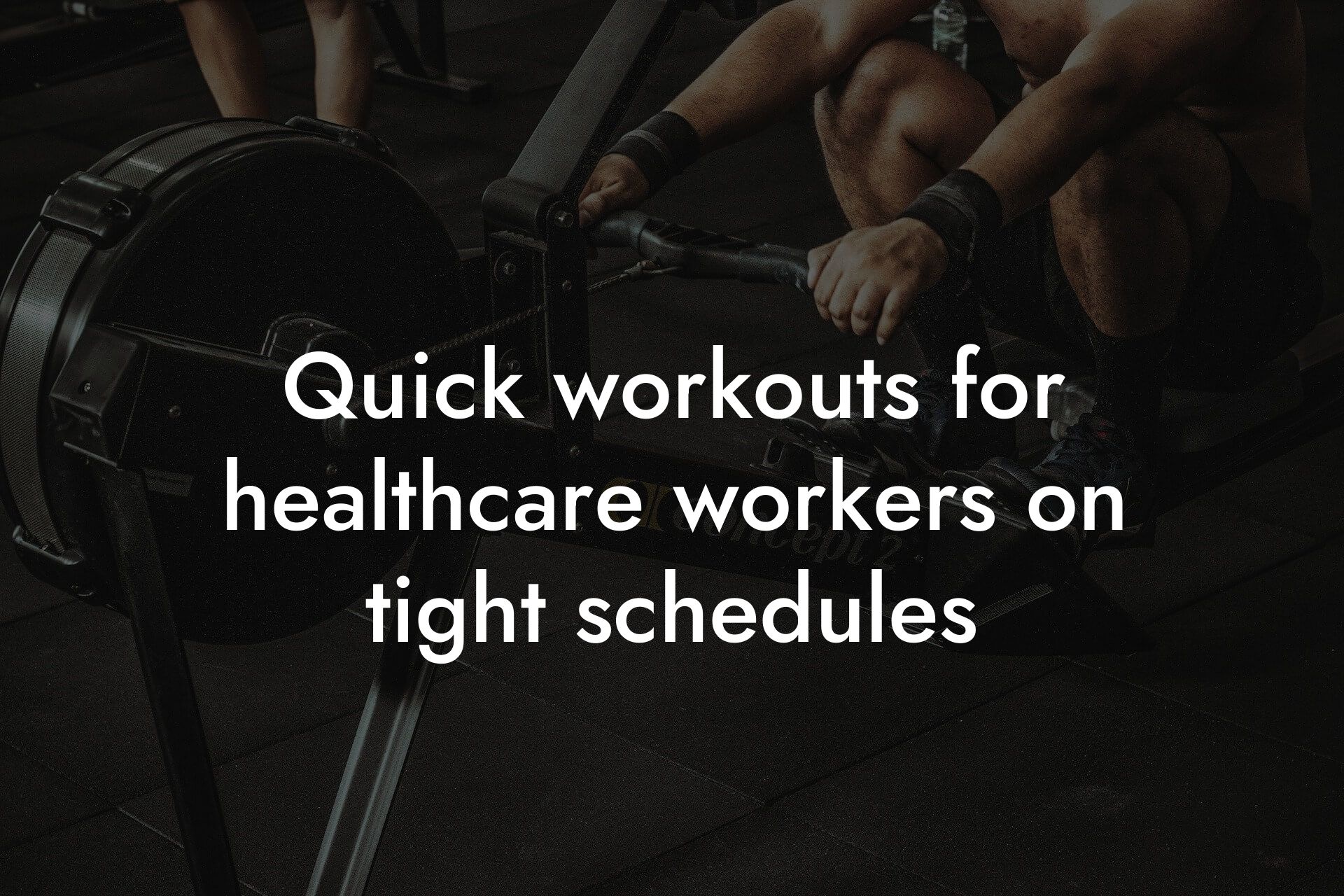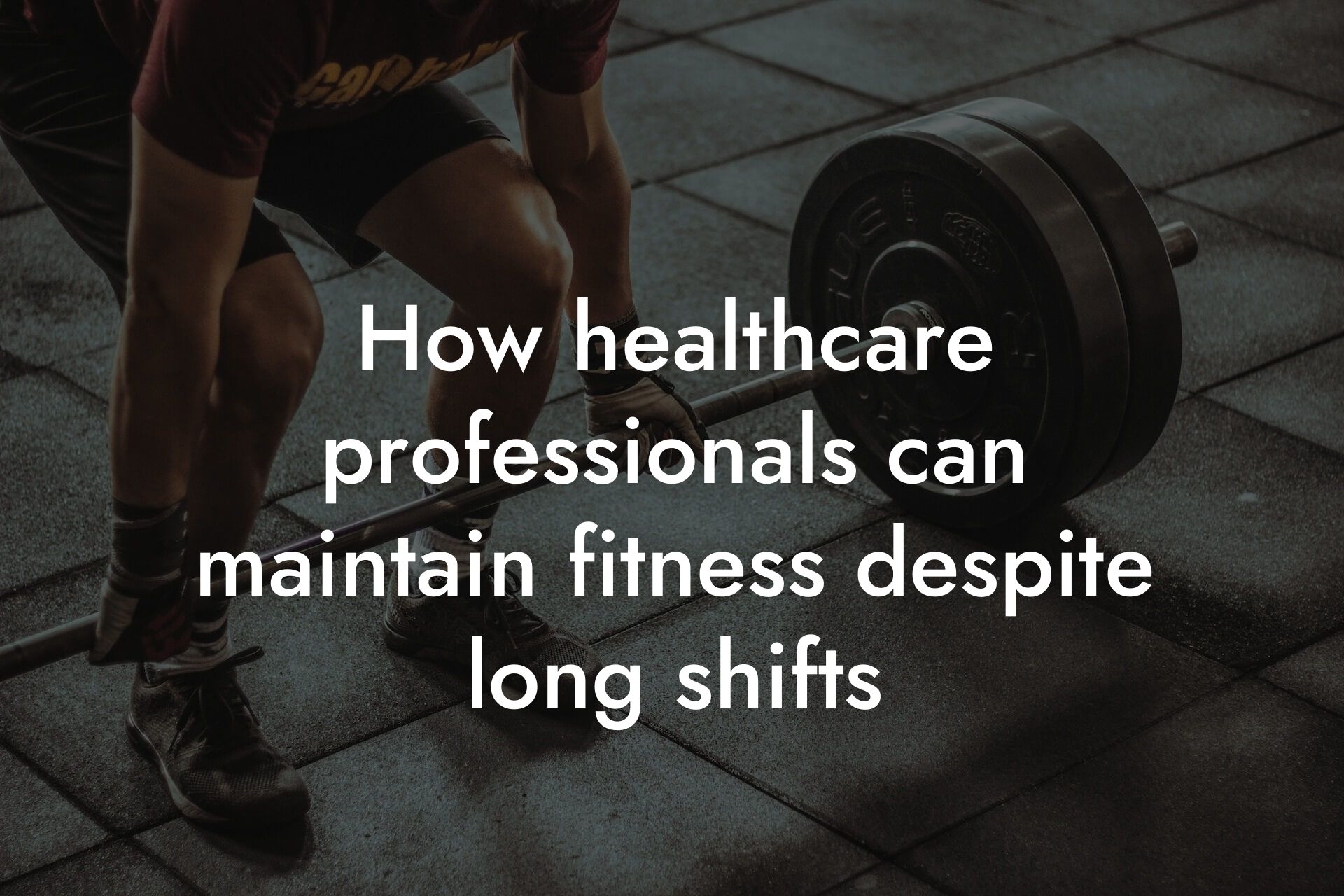As a high-earning professional in the healthcare industry, you understand the importance of maintaining a healthy work-life balance. However, the demands of your job can often lead to chronic stress, which can negatively impact your physical and mental well-being. One effective way to manage stress is through physical fitness. In this article, we will explore the benefits of physical fitness in reducing stress, and provide you with practical tips and strategies to incorporate exercise into your busy schedule.
Table of Contents
- The Impact of Stress on Healthcare Professionals
- The Benefits of Physical Fitness in Reducing Stress
- Types of Exercise for Stress Relief
- Incorporating Exercise into Your Busy Schedule
- Overcoming Barriers to Exercise
- Tracking Progress and Setting Goals
- The Role of DEXA Scans in Fitness Tracking
- Frequently Asked Questions
The Impact of Stress on Healthcare Professionals
Healthcare professionals, including doctors, nurses, and administrators, are at high risk of experiencing stress and burnout. The high-pressure environment, long hours, and emotional demands of the job can lead to physical and mental exhaustion. Chronic stress can manifest in various ways, including anxiety, depression, insomnia, and cardiovascular disease. Moreover, stress can impair cognitive function, leading to decreased productivity, poor decision-making, and increased risk of medical errors.
The Benefits of Physical Fitness in Reducing Stress
Regular physical activity has been shown to have a positive impact on stress reduction. Exercise stimulates the production of endorphins, also known as "feel-good" hormones, which can help alleviate symptoms of anxiety and depression. Physical fitness can also improve sleep quality, boost mood, and increase energy levels. Furthermore, exercise can provide a healthy distraction from the demands of work, allowing you to clear your mind and recharge.
Types of Exercise for Stress Relief
There are various types of exercise that can help reduce stress, including:
Aerobic exercise, such as running, cycling, or swimming, can help reduce anxiety and improve mood. High-intensity interval training (HIIT) has also been shown to be effective in reducing stress and improving cardiovascular health.
Yoga and Pilates can help reduce stress and anxiety by promoting relaxation and improving flexibility. These low-impact exercises can also improve sleep quality and reduce symptoms of depression.
Resistance training, such as weightlifting, can help improve mood and reduce symptoms of anxiety and depression. This type of exercise can also improve bone density, which is essential for healthcare professionals who may be at risk of osteoporosis.
Incorporating Exercise into Your Busy Schedule
As a busy healthcare professional, finding time to exercise can be challenging. However, there are several ways to incorporate physical activity into your daily routine:
Schedule exercise into your daily planner, just as you would any other appointment. Treat it as a non-negotiable part of your daily routine.
Find exercises that can be done in short intervals, such as bodyweight exercises or HIIT workouts, which can be completed in as little as 10-15 minutes.
Use your lunch break to fit in a workout. Even a short walk or some stretching exercises can be beneficial.
Consider working with a personal trainer or fitness coach who can help you develop a customized exercise plan that fits your schedule and goals.
Overcoming Barriers to Exercise
Despite the benefits of exercise, many healthcare professionals may face barriers that prevent them from engaging in regular physical activity. Common barriers include:
Lack of time: As mentioned earlier, finding time to exercise can be challenging. However, with a little creativity and planning, it is possible to incorporate exercise into even the busiest of schedules.
Lack of energy: Chronic stress and fatigue can make it difficult to muster the energy to exercise. However, regular physical activity can actually increase energy levels and reduce fatigue.
Lack of motivation: It can be difficult to stay motivated to exercise, especially if you're new to physical activity. Working with a personal trainer or fitness coach can help provide accountability and motivation.
Tracking Progress and Setting Goals
Tracking progress and setting goals is an essential part of any exercise program. As a healthcare professional, you understand the importance of data-driven decision-making. By tracking your progress, you can:
Monitor changes in body composition, including fat mass, lean mass, and bone density.
Track improvements in cardiovascular health, including blood pressure and heart rate.
Set realistic and achievable goals, such as increasing exercise frequency or duration.
Use data to stay motivated and engaged in your exercise program.
The Role of DEXA Scans in Fitness Tracking
At Tano Performance Group, we understand the importance of tracking progress and setting goals. That's why we offer DEXA scans, a non-invasive and highly accurate method of tracking body composition. DEXA scans can provide valuable insights into:
Body fat percentage and distribution.
Lean mass and muscle mass.
Bone density and osteoporosis risk.
Visceral fat and metabolic health.
By incorporating DEXA scans into your fitness tracking, you can gain a deeper understanding of your body and make data-driven decisions to improve your overall health and well-being.
Managing stress through physical fitness is an essential part of maintaining a healthy work-life balance as a healthcare professional. By incorporating exercise into your daily routine, you can reduce stress, improve mood, and increase energy levels. Remember to track progress, set goals, and use data to stay motivated and engaged in your exercise program. At Tano Performance Group, we are committed to providing you with the tools and resources you need to take your physical fitness to the next level. Contact us today to learn more about our DEXA scans and personalized fitness coaching services.
Frequently Asked Questions
What is the impact of stress on healthcare professionals?
Stress can have a significant impact on healthcare professionals, leading to burnout, decreased job satisfaction, and compromised patient care. Chronic stress can also lead to physical health problems, such as cardiovascular disease, digestive issues, and a weakened immune system. Furthermore, stress can affect mental health, causing anxiety, depression, and mood disorders.
How does physical fitness help manage stress?
Physical fitness is a natural stress-reliever that can help reduce anxiety and depression by releasing endorphins, also known as "feel-good" hormones. Regular exercise can also improve sleep quality, boost mood, and increase energy levels, all of which can help mitigate the effects of stress. Additionally, physical fitness can provide a healthy distraction from the demands of working in the healthcare industry.
What are some common stressors faced by healthcare professionals?
Healthcare professionals often face high-pressure situations, long hours, and heavy workloads, which can lead to stress and burnout. Other common stressors include managing complex patient cases, dealing with difficult patients or families, and navigating administrative tasks and paperwork.
How can I fit physical fitness into my busy schedule as a healthcare professional?
Finding time for physical fitness can be challenging, but it's not impossible. Try breaking up your exercise routine into shorter sessions, such as 20-30 minutes, and aim to do something physical every day. You can also incorporate physical activity into your daily routine, such as taking the stairs instead of the elevator or going for a walk during your lunch break.
What are some effective exercises for reducing stress?
Yoga, Pilates, and meditation are all effective exercises for reducing stress and anxiety. These low-impact activities can help calm the mind and body, promoting relaxation and reducing feelings of stress and tension. Cardio exercises, such as running or cycling, can also help reduce stress by releasing endorphins and improving mood.
How does physical fitness impact bone density?
Regular exercise, especially weight-bearing and resistance training, can help improve bone density, reducing the risk of osteoporosis and fractures. This is especially important for healthcare professionals, who may be at risk for bone loss due to prolonged periods of sitting or standing.
Can physical fitness improve my physique and body fat percentage?
Absolutely! Regular exercise, combined with a healthy diet, can help improve physique and body fat percentage. Resistance training can help build muscle mass, while cardio exercises can help burn fat and reveal lean muscle tone. Additionally, exercise can improve overall body composition, leading to a more toned and fit physique.
What are some tips for getting started with a physical fitness routine?
Start small and set realistic goals for yourself. Begin with short, manageable sessions and gradually increase duration and intensity as you become more comfortable. Find an exercise buddy or accountability partner to help motivate you, and consider working with a personal trainer or fitness coach to develop a customized workout plan.
How can I stay motivated to continue my physical fitness routine?
Track your progress, celebrate small victories, and reward yourself for reaching milestones. Find exercises you enjoy and vary your routine to avoid boredom and prevent plateaus. Also, remember why you started in the first place – to improve your physical and mental health, and to better manage stress.
What are some common barriers to physical fitness for healthcare professionals?
Common barriers to physical fitness for healthcare professionals include lack of time, energy, and motivation. Additionally, many healthcare professionals may prioritize patient care over self-care, leading to neglect of their own physical and mental health.
How can I prioritize self-care as a healthcare professional?
Make self-care a non-negotiable part of your daily routine, just like brushing your teeth or taking a shower. Schedule time for physical fitness, meditation, and relaxation, and prioritize activities that bring you joy and fulfillment. Remember, taking care of yourself is essential to providing high-quality patient care.
What are some resources available to help healthcare professionals manage stress and improve physical fitness?
Tano Performance Group offers a range of resources, including articles, webinars, and personalized coaching services, to help healthcare professionals manage stress and improve physical fitness. Additionally, many hospitals and healthcare organizations offer employee wellness programs, fitness classes, and mental health resources.
How can I incorporate mindfulness into my physical fitness routine?
Incorporate mindfulness into your physical fitness routine by focusing on the present moment, letting go of distractions, and paying attention to your breath and body. Practice mindfulness exercises, such as meditation or deep breathing, before or after your workout to enhance the benefits of physical fitness.
What are some benefits of group fitness classes for healthcare professionals?
Group fitness classes can provide a sense of community and accountability, helping healthcare professionals stay motivated and engaged. Additionally, group classes can offer a much-needed break from the demands of patient care, providing a healthy distraction and stress-relief.
How can I measure the impact of physical fitness on my stress levels?
Track your stress levels using a stress journal or app, and monitor your physical fitness progress through measurements such as body fat percentage, weight, or distance run. You can also pay attention to how you feel – do you have more energy, sleep better, or feel more relaxed?
What are some tips for staying hydrated during physical fitness activities?
Drink plenty of water before, during, and after exercise, and avoid sugary drinks that can dehydrate you further. Aim to drink at least 8-10 glasses of water per day, and consider incorporating electrolyte-rich drinks or supplements to help replenish lost electrolytes.
How can I balance physical fitness with other aspects of my life?
Make physical fitness a priority, but don't sacrifice other important aspects of your life, such as relationships, work, or hobbies. Find ways to incorporate physical fitness into your daily routine, such as exercising during your lunch break or finding activities that involve your loved ones.
What are some common myths about physical fitness and stress relief?
One common myth is that you need to be a certain age or fitness level to start exercising. Another myth is that exercise has to be intense or time-consuming to be effective. The truth is, any amount of physical activity can provide stress-relief and improve overall health.
How can I make physical fitness a sustainable part of my lifestyle?
Make physical fitness a habit by incorporating it into your daily routine, finding exercises you enjoy, and celebrating small victories. Also, find a workout buddy or accountability partner to help motivate you, and consider working with a personal trainer or fitness coach to develop a customized workout plan.
What are some benefits of physical fitness for mental health?
Physical fitness has numerous benefits for mental health, including reduced symptoms of anxiety and depression, improved mood, and enhanced cognitive function. Exercise can also increase self-esteem and body confidence, leading to a more positive overall outlook on life.
How can I get my colleagues or friends involved in physical fitness activities?
Invite them to join you for a workout, share your own fitness journey and successes, and offer to help them develop a workout plan. You can also organize group fitness classes or activities, such as a charity run or fitness challenge, to encourage participation and camaraderie.
What are some tips for avoiding burnout as a healthcare professional?
Prioritize self-care, set realistic boundaries, and take regular breaks to rest and recharge. Also, seek support from colleagues, mentors, or mental health professionals, and consider taking time off or delegating tasks when necessary.
How can I incorporate physical fitness into my patient care?
Encourage patients to prioritize physical fitness as part of their overall health and wellness plan. Provide resources and referrals for fitness classes or personal training, and incorporate physical activity into treatment plans when appropriate.
Here are some related articles you might love...
- Quick workouts for healthcare workers on tight schedules
- Nutrition strategies for energy during long surgeries
- How healthcare professionals can maintain fitness despite long shifts
- The connection between body composition and job performance in healthcare
- How to maintain bone density in physically demanding healthcare roles
- The impact of physical health on patient care
- How DEXA scans can benefit healthcare professionals
- How to balance night shifts with fitness goals
- The importance of fitness for preventing healthcare worker burnout
Zak Faulkner
Zak Faulkner is a leading authority in the realm of physical health and body composition analysis, with over 15 years of experience helping professionals optimise their fitness and well-being. As one the experts behind Tano Performance Group, Zak has dedicated his career to providing in-depth, science-backed insights that empower clients to elevate their physical performance and overall health.
With extensive knowledge of DEXA technology, Zak specializes in delivering comprehensive body assessments that offer precise data on body fat, muscle mass, bone density, and overall physique. His expertise enables individuals to make informed decisions and achieve their fitness goals with accuracy and confidence. Zak’s approach is rooted in a deep understanding of human physiology, combined with a passion for helping clients unlock their full potential through personalised strategies.
Over the years, Zak has earned a reputation for his commitment to excellence, precision, and client-focused service. His guidance is trusted by top professionals who demand the best when it comes to their health. Whether advising on fitness programs, nutritional strategies, or long-term wellness plans, Zak Faulkner’s insights are a valuable resource for anyone serious about taking their health and fitness to the next level.
At Tano Performance Group, Zak continues to lead our Content Team revolutionising how professionals approach their physical health, offering unparalleled expertise that drives real results.




